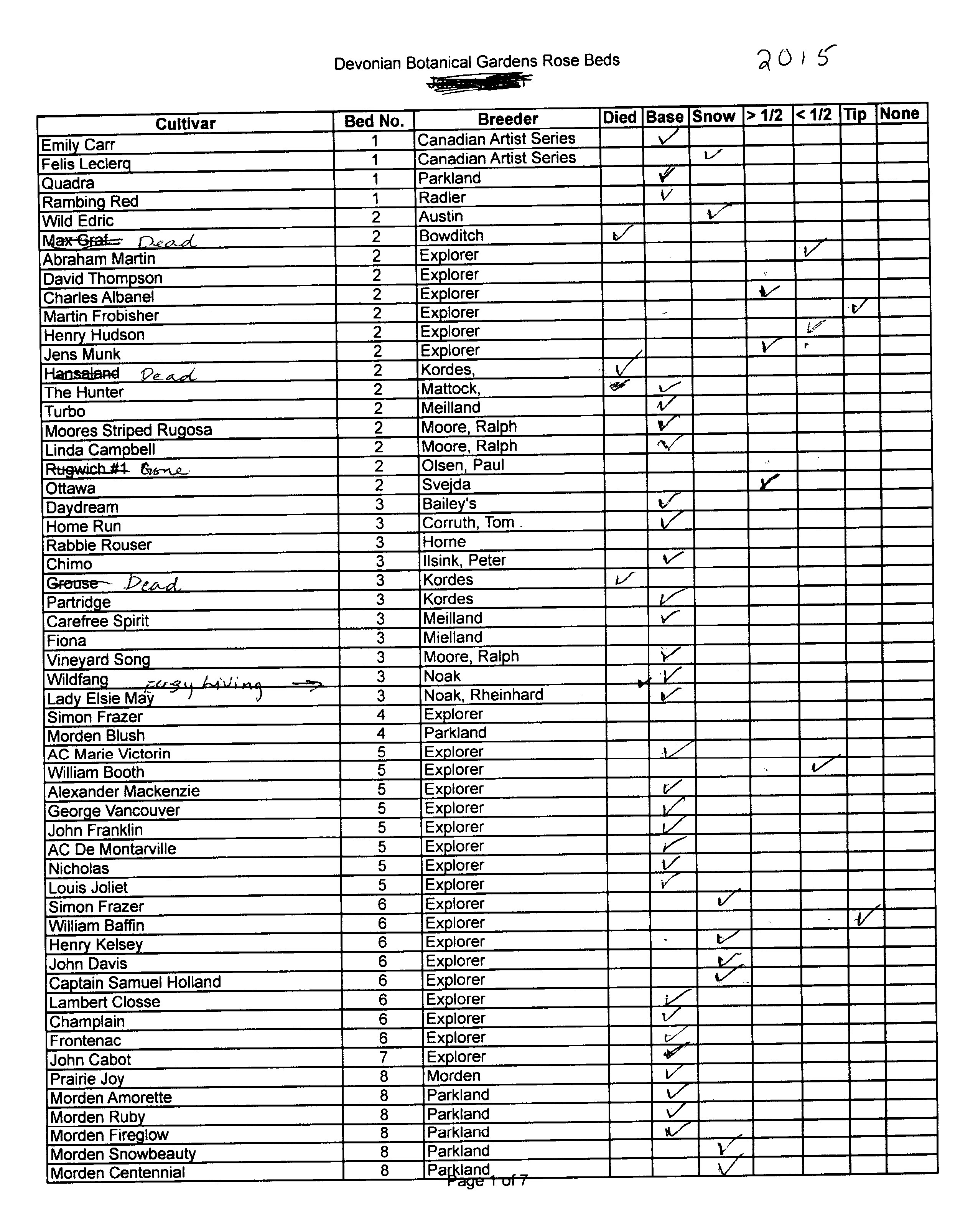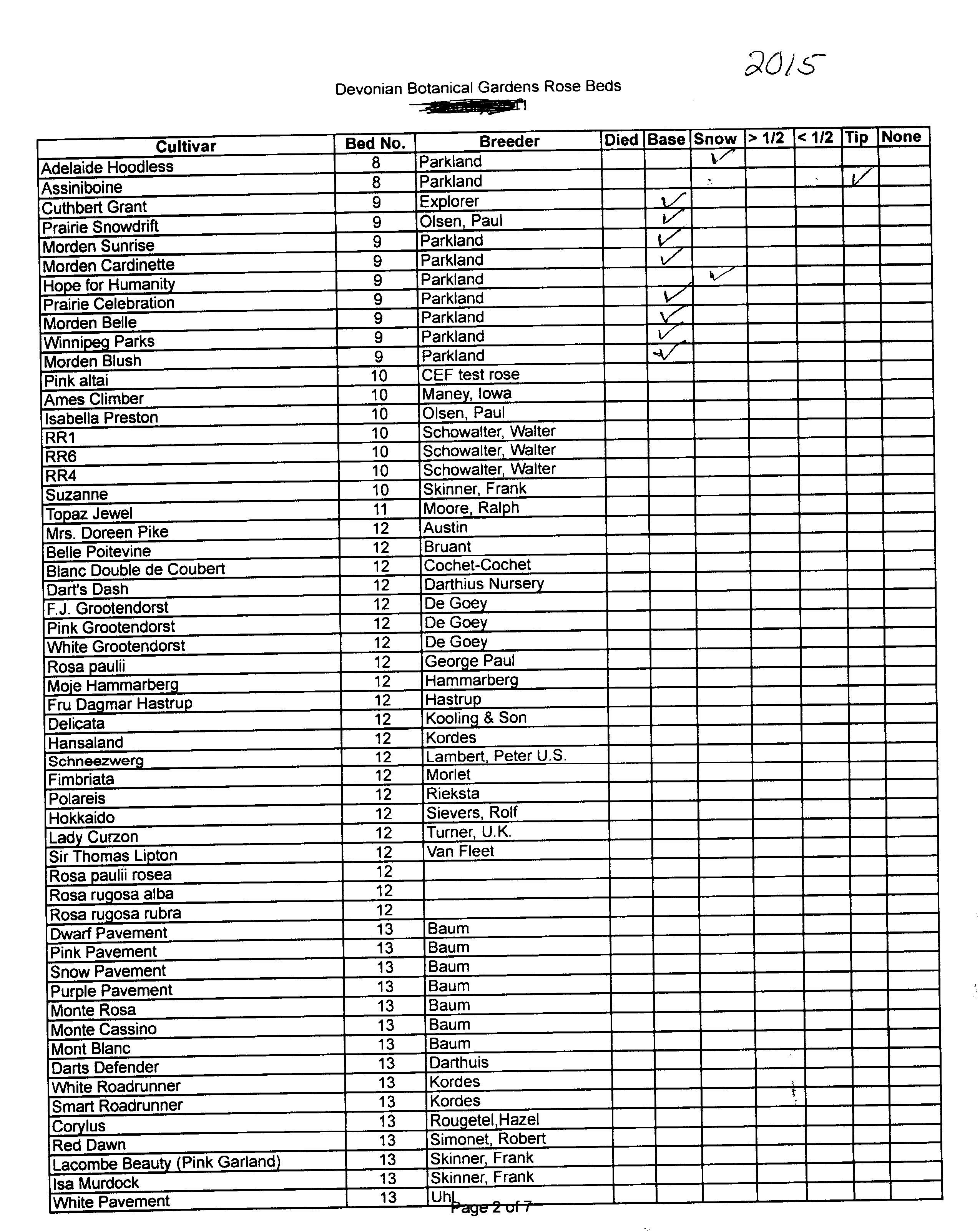The search capabilities here don’t allow for some common words so I was not successful in finding a thread on this subject. I’m looking for recommendations for a rose of smaller stature, diploid, hardy, fairly disease resistant, yellow/peach/orange color range and is fertile. Any suggestions?
Rob,
Finding a rose that fits all those criteria is going to be hard. I’m sure you’ve done quite a bit of research already so you know what’s out there. My plan is to use a healthy triploid to incorporate yellow into my diploid roses, but it’s been tough finding a decent yellow triploid also. The latest one that seems to have good disease resistance is Lemon Fizz. It’s not very hardy but it fits most of your other criteria. I plan to cross it with one or two of my hardy diploids next year along with a couple tetraploids as well. We’ll see how well those do.
Rob have you used Kim’s 1-72-1 x Hugonis? It’s a cross of a mini and the hardy R.hugonis and I’m not positive how large it is but you should get range of sizes and degrees of hardiness in the offspring. I used it’s pollen in 2014 on 5 different plants with it taking on only 3 of them. Not surprisingly it took best on my Ross Rambler #1 OP, but I only got one seedling from that cross. I also have several seedlings with a (Showy Pavement x R.blanda) x (Marie Pavie x R.blanda) and one clearly shows the R.hugonis influence. They haven’t bloomed yet but I’m really interested to see what they look like.
Rob
I don’t know that any of these fit your requirements but thought it would be of interest that they do OK at the Devonian Garden near Edmonton, Alberta. Canada zone 3.
Robusta, Rosy Vision, Cape Diamond, Apple Jack, Chimo, Lady Elsie May, Vineyard Song, Home Run, Carefree Spirit, Wildfang, Fiona, Ramblin Red, Partridge, Linda Campbell, Moores Striped, Wild Edric, and Rambling Red, Topaz Jewel. I have ‘Hockey’ at home and it does OK too.
They all die to the crown over winter (similar to the Mordens) but come back to put on a nice show.
Hi Margit,
If I may digress a little. You said the Mordens die back in winter. How do the Explorers do in your area?
Chuckp
Paul,
Thank you for the suggestion of Lemon Fizz. I didn’t know anything about it so I looked it up on HMF and liked what I read and it looks great in pictures. I didn’t see that it has been used as a parent but the patent states that pollen is present so it might be better used as a pollen parent. Based on your mention of it, I ordered it for delivery next week. If it makes it through the winter I’ll use it this spring. Thanks for the recommendation.
I don’t have Kim’s 1-72-1xHugonis but would love to obtain it or some pollen next season. I do have Kim’s L56 x 1-72-1xHugonis and Pink Petticoat x 1-72-1xHugonis but neither is yellow.
Margit,
Thank you for your suggestions. I’ll look them up and find put more about them. I do have Cape Diamond already and used it as a parent this season and have some OP hips as well. Thank you again for your most recent package.
Best regards,
Kim sent me some1-72-1hugonis pollen in early 2014 and I still had some left after that breading season. I kept it to use this year but because I moved I didn’t get a chance to use it. I know Kim just moved this year also but I don’t know if he took that plant with him. And if he did take it with him it may take a couple years for it to bloom. Even though the two plants you have aren’t yellow but since the pollen parent of both are 1-72-1hugonis there is good chance one or both still have yellow alleles in them, so they may be worth a try if you can’t get 1-72-1hugonis pollen.
Lemon Fizz has been very healthy for me the two years I’ve had it and looking back at my records it survived the winter better than I had thought. Last year it wasn’t very big and in a pot so to protect it for the winter I buried it in the garden. None of the buried canes died, which may not sound like much but I’ve had plants like Yellow Submarine and Yellow Brick Road both die back to the crown even with being buried.
Paul,
You make a good point about kim’s seedlings. They are small plants so I’m not sure when I will get blooms but will definitely use them when they do bloom. Have you used Lemon Fizz as a parent yet?
No I haven’t but I think Julie Overom and David Zlesak have used it as the seed parent. Mine has a few OP hips on it now.
Great to learn that it is female fertile. I wish the parentage was listed. Thanks Paul.
In response to Charles Pilgrim’s earlier query about winter injury of the Explorer roses at Devonian Botanic Garden, I have attached the most recent report I made. The 2014/2015 winter was milder than normal with no temps near -40C.


Margit,
I’m disappointed to read that Quadra and Frontenac died back to the base during a mild winter. Thank you for posting your list.
Margit- thanks very much for posting this- very interesting. What kind of freeze-thaw do you get up in Devon? Are you within the Chinook belt? Do you generally keep a snow cover all winter there?
Thanks Margit, for providing this information. I’m surprise that the explorer roses demonstrate such a low
degree of winter hardiness at the Devonian Gardens.
I join Donald in wondering what climatic conditions does the DG experience in winter?
I have a some crosses with tender roses and Explorers and Parklands. They are green to the tip, when we
receive normal snowfall.
Canadian Rose breeders need to establish test gardens across this vast country so we can test our roses in different
growing zones. Public Gardens like The Montreal Botanical Gardens, The Assiniboine Gardens here in Winnipeg
and Devonian in Alberta,and the Butchart Gardens on Vancouver Island and others should take on a leading role.
As you can imagine, money for this project is and will be a problem.
Chuckp
Charles, Rob and Donald
The roses at the Devonian Botanic Garden are generally stressed. The soil is mostly sand. They are watered sparingly, not fertilized and are spray free.
Usually there is at least 3 to 4 inches of snow before a deep freeze (-20C or so). Typically there are no Chinooks but one can count on at least one mid-winter thaw usually in January or February. The snow will melt a bit but does not disappear.
Looking back at my previous notes, only ‘AC Marie Victorian’ and ‘Winnipeg Parks’ survived to the snowline other years which was better than shown in the 2014/2015 report.
I’ll try to get to St. Albert Botanical Park this spring and make a winter injury report for that location. The roses are better cared for although they haven’t had a dedicated rose volunteer for a few years. Jim and Elizabeth Coutts have offered to do the same in Unity, Saskatchewan. Perhaps, Charles, you could report on the roses in Assiniboine Park in Winnipeg. I could create a generic spread sheet for the Explorers, Parklands and CA roses to make it easy. The categories of winter injury are based on the system developed by the Minnesota Agricultural Experimental Station in their publication Roses for the North. http://www.extension.umn.edu/garden/yard-garden/flowers/roses-for-the-north/
Margit,
I just revisited this thread today and wondered if you know of a source for Hockey. Very interesting parentage.
Rob
Rob,
Have you considered ‘Sunshine’? HMF gives the hardiness as USDA zone 6b and warmer, but I should hope the other parent would help in that regards.
Otherwise, it meets your requirements. And it’s a real charmer.
Karl
Thank you Karl. It does look like a charmer. Do you know anything about fertility. I see only one direct descendant.
Maybe not Minnesota hardy few are, but I can speak to have 5 to 10 of them in North Idaho zone 5 and all but one, and that one being planted late November made it through our 5th coldest winter of all time with 120+ inches of snow so there’s some hardness in her.